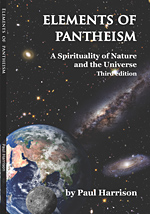Pantheism and Unitarian Universalism:
A harmonious match
Unitarian Universalism is based on the shared values of the Seven Principles, such as peace, democracy, tolerance and justice. However, it does not promote any particular answers to the ultimate questions about human existence – is there a God or gods? Are our souls separate from our bodies? Do we have personal afterlives? Is the Universe a projection of a collective consciousness?
Most people need answers to ultimate questions, and most UUs add in these answers from some other source, such as Humanism, Buddhism, Paganism, Christianity and so on.
Scientific Pantheism is extremely compatible with the Seven Principles of UUism. If you love nature and are science-minded in your outlook, you may find that it provides a nice complement to UUism.
The core of Pantheism
Many World Pantheist Movement members belong to Unitarian Universalist congregations and some are UU ministers. They tell us that perhaps a third or a half of Unitarian Universalists are probably strongly sympathetic to Pantheism.
The essence of Pantheism is a profound reverence for Nature and the wider Universe and awed recognition of their power, beauty and mystery. Some Pantheists use the word “God” to describe these feelings, but the majority prefer not to, so as to avoid ambiguity.
From this feeling flows the desire to make the most of our present life in our bodies on this earth, to care for nature, and to respect the rights of humans and animals in general. We choose to focus on the vibrant and urgent here and now, rather than on invisible realms, spirits, deities or afterlives.
We feel that Nature and the wider Universe are the most appropriate focus for our deepest reverence, rather than supernatural beings or afterlives. We believe that everything that exists is a part of Nature and tend to be skeptical of “supernatural” phenomena.
We believe that mind and body are an inseparable unity, and so we do not expect personal survival after death. Instead we look forward to a natural persistence of our time on earth, in the actions and creations we leave behind, memories people hold of us, and recycling of our elements in Nature.
Many people who have these feelings don’t call it Pantheism – they may call it atheism plus wonder and awe, they may call it religious humanism, spiritual humanism, religious naturalism or some other variant, or they may not have a name for it.
Pantheism and Panentheism
A related tendency often found in Unitarian Universalist congregations is
Panentheism. Panentheists hold that God is present in and throughout nature and humans, but also transcends them and is much greater than them. By contrast Pantheists consider that “God” is identical with Nature and the wider Universe, and use the term (if at all) primarily to express their own feelings towards Nature.
Basically Panentheism is a form of belief in a creator God, while Pantheism is not. Panentheism is fully compatible with traditional Christianity, Islam and Judaism, but Pantheism is not.
World Pantheism and Unitarian Universalism
The two organizations complement each other neatly.
World Pantheism shares the values of the UU Seven Principles. We are strongly committed to religious freedom, separation of church and state, religious tolerance and the teaching of science free from religious interference. We filed afriend-of-court brief in the US Supreme Court case, opposing the “under God” wording in the Pledge.
We have collected more signatures for UNESCO’s Manifesto for Peace and Non-Violence than any other US voluntary organization.
We are signatories of the Earth Charter. We endorse and greatly expand on the Unitarian Universalist seventh principle – Respect for the interdependent web of all existence of which we are a part. Active care for the environment is a central part of our ethic, along with human and animal rights. We aresaving rainforest via EcologyFund faster than any other religious or environmental group.
Many Unitarian Universalists, including ministers, are members and friends of the World Pantheist Movement. WPM members who belong to UU churches in some cases run courses on pantheism or pantheist services or regular small group meetings of pantheists. The WPM offers manyresources for Unitarian Universalists interested in pantheist services or groups.
So why be a UU Pantheist?
Unitarian Universalism is a context where you meet sensible sociable tolerant people with varying religious philosophies for shared spiritual exploration and social action. But Unitarian Universalist congregations are focused more on broad spiritual exploration and social justice, and UUism in itself does not offer answers to life’s ultimate questions. Many people need both a social context AND a belief context in order to feel comfortable with their place in the universe.
With its special focus on Nature and Naturalism, World Pantheism can be considered as one of the main flavors of Unitarian Universalism, such as UU Buddhism, Religious Humanism, Unitarian Universalist Paganism and so on. If you consider yourself an atheist or humanist with spiritual feelings and a deep love of nature – or if you are a pagan who enjoys nature-oriented celebration but does not believe in the literal reality of gods, spirits and magick – then World Pantheism may be the spiritual context you are looking for.
UU Resources |
|
PDF leaflet on Unitarian Universalism and World Pantheism Sermons and services on pantheism given in UU churches |

